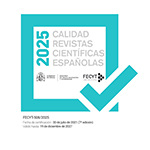La investigación sobre montaje cinematográfico en Web of Science en communication, film, radio & television, psychology y neurosciences & neurology
Resumen
Este artículo presenta un análisis descriptivo de los artículos científicos presentes en Web of Science que atienden al montaje cinematográfico entre 1976 y 2019 (n 148). El análisis bibliométrico atiende al autor, sexo, universidad de afiliación, idioma, revista, nacionalidad de la revista, año de creación de la revista, tipología del trabajo, palabras clave, año de publicación, número de citas recibidas y categoría de WoS en la que se recogen las publicaciones. Además, se realiza un análisis cuantitativo de los resúmenes y textos de las publicaciones disponibles en línea, cuya finalidad es detectar los temas, muestras y metodologías frecuentemente empleados. Los resultados ponen de manifiesto que desde 2015 se ha producido un leve aumento del interés en el montaje. Aún así, su atención es escasa. Pese a que hay un mayor número de revistas que atienden al tema, cada una publica únicamente un artículo al año sobre montaje. Las revistas con más artículos sobre montaje son británicas y estadounidenses, pero también destaca la española Atalante. La mayor parte de publicaciones se realizan en revistas que abordan el montaje desde una perspectiva cognitiva o neuropsicológica, que son las que aglutinan los artículos más citados. Las investigaciones sobre montaje suelen presentar análisis del montaje de la filmografía de algún autor o de técnicas o largometrajes específicos. Siguen mayoritariamente una metodología cualitativa, centrada en recursos o autores vinculados al montaje constructivo principalmente, o presentan experimentos neuropsicológicos.
Descargas
Descarga artículo
Licencia
La revista Arte, Individuo y Sociedad, para fomentar el intercambio global del conocimiento, facilita el acceso sin restricciones a sus contenidos desde el momento de su publicación en la presente edición electrónica, y por eso es una revista de acceso abierto. Los originales publicados en esta revista son propiedad de la Universidad Complutense de Madrid y es obligatorio citar su procedencia en cualquier reproducción total o parcial. Todos los contenidos se distribuyen bajo una licencia de uso y distribución Creative Commons Reconocimiento 4.0 (CC BY 4.0). Esta circunstancia ha de hacerse constar expresamente de esta forma cuando sea necesario. Puede consultar la versión informativa y el texto legal de la licencia.










